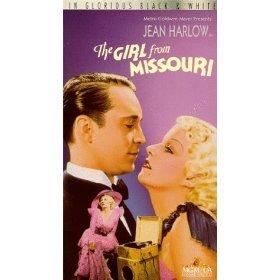“You could make me cheap and common.”
In Girl From Missouri Jean Harlow plays Eadie Chapman–a lowly chorus girl who’s determined to marry a millionaire. She gets herself added to the bevy of dancers slated to entertain geriatric millionaires and soon latches onto the crusty T.R Paige (Lionel Barrymore). Paine is at first amused by Eadie’s brazen behaviour, but sensing she’s trouble (and calling her a “blonde chiseller”) he fobs her off with some money right before he leaves for his home in Palm Beach. Eadie follows in hot pursuit–dragging along her faithful friend Kitty (Patsy Kelly).
 Once in Palm Beach, Eadie elbows her way into Paige’s life and meets his playboy son, Tom (Franchot Tone). He severely underestimates Edie’s gold-digging tendencies, and interprets her morality to mean that she can be had for a few sparkly trinkets. He doesn’t realise that her insistence on marrying a rich man is based on her experiences with poverty. While he’s wildly attracted to her, marriage is the last thing on his mind, and it’s the only thing on hers.
Once in Palm Beach, Eadie elbows her way into Paige’s life and meets his playboy son, Tom (Franchot Tone). He severely underestimates Edie’s gold-digging tendencies, and interprets her morality to mean that she can be had for a few sparkly trinkets. He doesn’t realise that her insistence on marrying a rich man is based on her experiences with poverty. While he’s wildly attracted to her, marriage is the last thing on his mind, and it’s the only thing on hers.
Girl From Missouri is a wonderful, light film, and with a sparkling script written by Anita Loos, Harlow is at her comedic best. Some of the funniest scenes occur when she crashes into high society and tries her best to act like a lady. In one hilarious scene, Eadie wears an atrocious, impractical negligee that’s covered with ostentatious feathers. Friend Kitty helps with the comedy–while Edie hunts for millionaires, Kitty eyes any man in sight. The role of Eadie also allows Harlow to display the breadth of her acting skills in a scene when she tackles Tom and stands her ground fiercely. There’s nothing too serious here, but it’s all great fun. From director Jack Conway.


You must be logged in to post a comment.